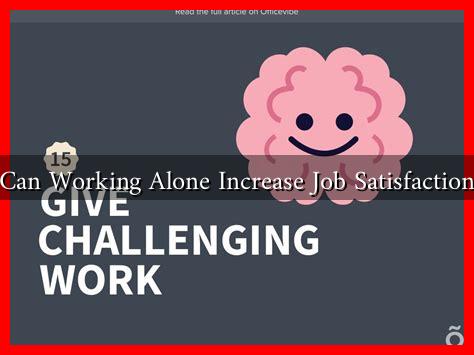-
Table of Contents
Can Working Alone Increase Job Satisfaction?
In today’s fast-paced work environment, the dynamics of teamwork and collaboration are often emphasized. However, a growing body of research suggests that working alone can also lead to increased job satisfaction. This article explores the benefits and drawbacks of solitary work, providing insights into how it can enhance employee well-being and productivity.
The Rise of Remote Work and Solitary Roles
The COVID-19 pandemic has accelerated the trend of remote work, leading many employees to experience solitary work environments. According to a report by McKinsey, 20-25% of the workforce in advanced economies could work remotely three to five days a week without losing productivity. This shift has prompted a reevaluation of how working alone can impact job satisfaction.
Benefits of Working Alone
Working alone can offer several advantages that contribute to job satisfaction:
- Increased Autonomy: Employees who work alone often enjoy greater control over their tasks and schedules. This autonomy can lead to a sense of ownership and responsibility, enhancing job satisfaction.
- Fewer Distractions: Solitary work environments typically have fewer interruptions, allowing individuals to focus deeply on their tasks. Research from the University of California found that it takes an average of 23 minutes to regain focus after a distraction.
- Personalized Work Environment: Working alone allows individuals to create a workspace that suits their preferences, whether it’s a quiet home office or a favorite café. This personalization can lead to increased comfort and satisfaction.
- Enhanced Creativity: Solitary work can foster creativity, as individuals have the freedom to explore ideas without the constraints of group dynamics. A study published in the journal *Psychological Science* found that solitude can enhance creative problem-solving.
Case Studies: Success Stories of Solitary Workers
Several successful individuals have thrived in solitary work environments, showcasing the potential benefits:
- J.K. Rowling: The author of the Harry Potter series often wrote alone in cafés, finding that solitude helped her concentrate and develop her ideas.
- Steve Wozniak: The co-founder of Apple Computer often worked alone on his projects, which allowed him to innovate without the constraints of a team.
These examples illustrate how working alone can lead to significant achievements and personal satisfaction.
Potential Drawbacks of Solitary Work
While there are many benefits to working alone, it is essential to consider the potential drawbacks:
- Isolation: Prolonged solitary work can lead to feelings of loneliness and disconnection from colleagues, which may negatively impact mental health.
- Lack of Collaboration: Working alone can limit opportunities for collaboration and idea exchange, which are often crucial for innovation.
- Self-Motivation Challenges: Some individuals may struggle with self-discipline and motivation when working alone, leading to decreased productivity.
Finding the Right Balance
To maximize job satisfaction, it is crucial to find a balance between solitary work and collaboration. Here are some strategies:
- Set Clear Boundaries: Define specific times for solitary work and collaborative efforts to ensure a healthy mix.
- Utilize Technology: Use tools like video conferencing and project management software to stay connected with colleagues while working alone.
- Schedule Regular Check-Ins: Regularly connect with team members to maintain relationships and share ideas, even when working independently.
Conclusion
In conclusion, working alone can indeed increase job satisfaction for many individuals, offering benefits such as autonomy, reduced distractions, and enhanced creativity. However, it is essential to be mindful of the potential drawbacks, including feelings of isolation and the challenges of self-motivation. By finding the right balance between solitary work and collaboration, employees can create a fulfilling work experience that enhances both productivity and well-being. As the future of work continues to evolve, understanding the dynamics of solitary work will be crucial for organizations aiming to foster a satisfied and engaged workforce.
For further reading on the impact of remote work on job satisfaction, you can explore resources from the McKinsey Global Institute.

